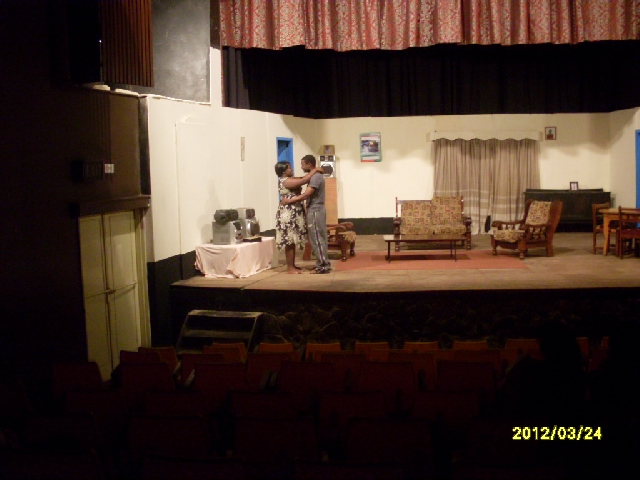
This write-up deals with stage theatre – the form of theatre that seems to concern most theatre practitioners.
Almost everyone agrees that stage theatre in Zambia is not as vibrant as it used to be. There are several reasons for this decline.
The most obvious one is the impact of movie making on the art form because of the money to be earned from movies by writers of plays, producers, directors, actors and other theatre-related practitioners.
Actors in theatre clubs and institutions have left, almost en masse, to seek wealth from movies.
But there are many artists who still long to act on stage and there are many people in the community who long to watch a live play on stage.
Can stage theatre be revived or is it a dying art?
Stage theatre is far from being a dying art form. It only seems to be dying in Zambia because we have failed to understand the intricacies of stage theatre.
Stage theatre is an art form that has its own unique appeal and culture. Like anything else, stage theatre has its own audience. We find it easy to accept that not everyone likes to watch Soccer, Rugby, Cricket, Tennis, Boxing, Volleyball and many other such forms of entertainment. Yet we fail to accept that not everyone likes to watch stage theatre in the form of live plays.
When we say that stage theatre is in decline, we are probably using the wrong standard. We are using money and the size of audiences as a measure of how well stage theatre is doing.
Because theatre auditoriums are not always full and the income is nothing to write home about, should we, therefore, conclude that stage theatre is in a crisis?
Whereas I personally don’t think that stage theatre is in intensive care, I agree that a lot needs to be done to make it more vibrant once again.
In an effort to try and do something about the problem, we have looked at infrastructure, sponsorship, money (or rather its lack) and the lack of Government support, but we have failed to look inwards – at ourselves! We have ignored the people behind stage theatre. It has been said that no institution is greater than the people behind it. In other words, stage theatre cannot be greater than the people behind it.
In this regard, I believe that there are lessons to be drawn from our experience of theatre in the 80s. There is nothing magical about the 80s. It just happens to be a period when some of us were most active in theatre.
The lessons to be learnt from the 80s hinge on the people’s attitude and approach to theatre. For instance, those days we did not go to theatre for money. We went to theatre for the love of it.
Theatre practitioners participated in theatre for social and psychological fulfilment. The feeling of satisfaction from successfully performing a play was far more rewarding than any monetary gain from the play. In fact, I can safely say that there was very little financial gain from performing a play those days.
I am not saying that it is wrong to seek financial rewards from the performance of plays. All I am saying is that if we make that the chief goal of our theatre, mediocre performances will continue to be the order of the day.
For stage theatre to flourish, there must be people who are willing to participate in it for the love of it, that is, people who regard stage theatre as a training ground for useful skills that can later be commercially exploited.
One obvious attribute that actors and directors of stage plays possessed in the 80s was passion. Passion refers to a very strong feeling about something or a strong belief in something. If you have a passion for something, you have a strong interest in it and like it very much.
This explains why actors of the 80s could endure so much self-sacrifice to produce wonderful plays. For those of us who were privileged to watch plays those days, we do see a glaring difference in the quality of modern day performances. Today’s performances lack heart.
Actors are happy with merely delivering their lines and going through the motions of a play. The absence of passion from the plays is very evident.
Passion made actors rehearse a play three times a week, sometimes for up to three months. Rehearsals would sometimes last for four hours. To attend these rehearsals, actors had to walk long distances from their homes and walk back late in the night.
Again, I am not saying that this is what the modern actor should do. All I am saying is that we can learn something from the spirit of dedication possessed by actors of yesteryears.
Theatre practitioners of the 80s also possessed a spirit of exemplary discipline. This discipline was seen in the actors’ timekeeping and focus on their job. (Of course, we had our share of undisciplined actors who we sometimes needed to exclude from our productions!)
Those days, during performance nights, prospective performers would avoid alcohol and gather at the respective venue an hour or two before the performance. It was usual for actors to be quietly seated behind the stage reflecting on their forthcoming act.
Nowadays, actors seem to be all over the place, mingling with the people who have come to see the play. I have heard some actors and actresses saying to their friends and relatives, five minutes before the play, “You will see how well I have mastered the lines!”
With this kind of attitude among today’s actors and actresses, would you expect anything other than mediocre performances?
To achieve high standards of performances, the work was not left to the producer, director and actors. There was a marked spirit of teamwork which is evidently absent from our theatre organizations today.
Everyone in the given theatre organization found something to do to make a play possible. One role that is no longer played in most theatre houses is that of the usher. Ushers are very critical in maintaining order during the performance of a play.
They ensure, for example, that bottles and glasses are not taken into the theatre and see to it that members of the audience do not disturb a play by answering phone calls during a performance. They also prevent members of the audience from interrupting the performance through making uncontrolled running commentaries.
Last but not least, we had plenty of role models of theatre excellence in the society. People we could look up to for inspiration. These role models provided leadership to upcoming artists in terms of what values to inculcate in themselves. For obvious reasons, I will desist from mentioning the names of some of these eminent theatre persons.
My argument in this write-up is that, whereas it is important to identify the necessary support systems for effective theatre, true revival of stage theatre must start with the people who form the primary building block of theatre.
We need to identify people that are interested in doing theatre for the love of it. Stage theatre is not done necessarily to make money but to fulfill, among other things, the need for self-actualization. If we are able to find a way of making money from our theatre, well and good. If not, we should be satisfied with making money elsewhere to support our theatre endeavors.
Dr. Kenneth D. Plankey in his book, “The Tao of Acting writes:
“Acting is not a profession through which many people have earned a living. The vast
majority of “actors” are supporting themselves by work other than acting.”
Stage theatre cannot compete with movie theatre in terms of financial gain. The two arenas have their own distinctive characteristics and objectives.
Does this mean that there is no money to be made from stage theatre? Of course, there is, though not nearly as much as can be made from movie making.
It is even possible to have professional actors earn a living from theatre in Zambia. All that the professional theatre practitioner will need to learn is to do things differently.
For example, in order to earn an income from theatre, the professional stage actor will need to do the same play over and over again throughout the year, in the same venue, and repeat this across the country.
This is how stage actors overseas are able to recoup their financial investment into a play. Plays have been known to run continuously for weeks, even years, overseas.
In conclusion, I would like to point out that once we understand the difference between a live stage play and a movie – and the limitations of stage theatre – we shall be able to get back onto the stage for the love of acting.


